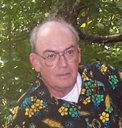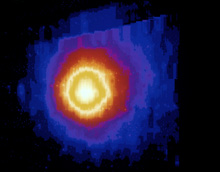MIT lecture by Chris Kraft
David Woods posted on ProjectApollo Yahoo groups
http://tech.groups.yahoo.com/group/ProjectApollo/
the following link to MIT World video with Chirs Kraft.
It is 2 hours well spent if you want to know what goes into planning for
Apollo and Shuttle missions and would like to do this again in going back to
the Moon.
- LRK -
--------------------------------------------------------------
MIT lecture by Chris Kraft
Posted by: "David Woods"
Mon Jan 8, 2007 2:26 pm (PST)
Good streaming video here:
<http://mitworld.mit.edu/play/337/>
of a lecture that Chris Kraft gave at MIT. He talks about pre-Apollo,
Apollo, Shuttle and the VSE programme. He's his usual forthright
self. Good stuff
David
-------------------------------
David Woods, from the Cogitorium
Web: http://www.wdwoods.com/
Photos: www.flickr.com/photos/moonmeister
--------------------------------------------------------------
It plays with a Real Player and you can select for different bandwidth.
- LRK -
--------------------------------------------------------------
Mission Control Operations
Video Run Time: 2:00:32
Technical Notes on Video:
Video length is 2:00:32.
Jeffrey Hoffman, Professor of the Practice, Aero-Astro Department, and
former shuttle astronaut, introduces Chris Kraft.
At 3:06, Kraft begins.
At 1:14:05, he invites questions.
At 1:59:46, Hoffman thanks Kraft.
--------------------------------------------------------------
Thanks for looking up with me.
Larry Kellogg
Web Site: http://lkellogg.vttoth.com/LarryRussellKellogg/
BlogSpot: http://kelloggserialreports.blogspot.com/
RSS link: http://kelloggserialreports.blogspot.com/atom.xml
Newsletter: https://news.altair.com/mailman/listinfo/lunar-update
==============================================================
http://mitworld.mit.edu/index.php
MIT WorldT is a free and open site that provides on-demand video of
significant public events at MIT.
--------------------------------------------------------------
SUPPORT MIT WORLD
We thank you for the thousands of emails of appreciation and welcome your
financial support. Contributions will offset our operating costs and allow
MIT World to grow while remaining a free and open presence on the web. Give
Now >
STAY CONNECTED
Receive email updates as new videos are added.
http://mitworld.mit.edu/dsp_register.php
Subscribe to our RSS feed.
http://mitworld.mit.edu/what_is_rss.php
Snip
==============================================================
http://mitworld.mit.edu/video/339/
ABOUT THE LECTURE:
Chris Kraft manages to present in a single event the ultimate in engineering
case studies, as well as an insider's history of 20th century space missions
and a pep talk for Aero-Astro students. This blunt raconteur describes the
challenges of the earliest space pioneers. His story begins with Project
Mercury in the 1950s, whose space task group of 35 included eight
secretaries. "We were capable people but didn't know a damn thing about how
to fly in space," recalls Kraft. How would they communicate with a man in
orbit, or assess his health? Most doctors thought when an astronaut left
earth's atmosphere, "he'd be a blithering idiot." Air to ground
communication in those days consisted of 20 words of teletype. "How do you
make real time decisions in those circumstances?" muses Kraft. He proudly
describes assembling the Mission Rules book, "probably the smartest thing we
ever did," which attempted to address all conceivable malfunctions on a
space mission. This was an early example of systems engineering, says Kraft.
When President Kennedy challenged NASA to get a man on the moon by the end
of the 1960s, "Chris Kraft did not know how to determine orbital mechanics
from 30 seconds of radar at Cape Canaveral. I thought the president was a
little daft." Suddenly, there were a whole new set of problems, such as how
to make sure a craft aimed at the moon did not just hit it. In the Gemini
and then Apollo programs, Kraft's team solved innumerable and breathtakingly
difficult issues. "We did a lot of things by the seat of our pants because
we didn't know any other way. We did it by feel, by having seen the past and
doing things the right way."
Kraft has some harsh words for the current state of space exploration. He
can't countenance NASA's abandoning the space shuttle. "We seem to have a
great propensity in this country for building something wonderful, great and
high performance and throwing it away..Golly, my mother would have gone
bananas!" He believes that NASA could have made the shuttle much more
efficient to fly, and used it as a key element in the new race back to the
Moon and to Mars. Kraft doesn't believe this program will get off the
ground-mainly because NASA hasn't built anything new in 25 years, "and
they've forgotten what it takes to do it." The next space mission, whatever
it turns out to be, will depend on the current crop of young aerospace
engineers. "Go do it, don't be frightened to fail," exhorts Kraft. "You
learn more from your failures than from your successes."
ABOUT THE SPEAKER:
Christopher C. Kraft, Jr. received a B.S. in aeronautical engineering from
Virginia Polytechnic University in 1944 and joined the Langley Aeronautical
Laboratory of the National Advisory Committee for Aeronautics (NACA) the
next year. In 1958, still at Langley, he became a member of the Space Task
Group developing Project Mercury and moved with the Group to Houston in
1962. He was flight director for all of the Mercury and many of the Gemini
missions and directed the design of Mission Control at what became the
Johnson Space Center (JSC) in 1973. He was director of the JSC from 1975
until his retirement in 1982. Since then he has remained active as an
aerospace consultant.
Wikipedia profile of Kraft
http://en.wikipedia.org/wiki/Christopher_C._Kraft,_Jr.
NOTES ON THE VIDEO (Time Index):
Video length is 2:00:32.
Jeffrey Hoffman, Professor of the Practice, Aero-Astro Department, and
former shuttle astronaut, introduces Chris Kraft.
At 3:06, Kraft begins.
At 1:14:05, he invites questions.
At 1:59:46, Hoffman thanks Kraft.
Snip
http://www.astronautix.com/astros/kraft.htm
==============================================================
WHAT THE MIND CAN CONCEIVE, AND BELIEVE, IT WILL ACHIEVE - LRK
==============================================================
Many folks would like to see us back on the Moon and developing its resources.
Tuesday, January 09, 2007
Subscribe to:
Post Comments (Atom)





No comments:
Post a Comment
Note: Only a member of this blog may post a comment.